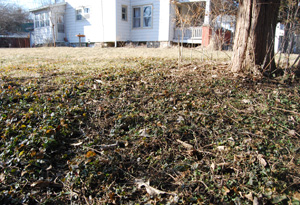The Trash That's a Treasure

Photo: Jessica Sain-Baird
She's never even planted a seed before, but new homeowner and eco-friendly journalist Simran Sethi finally is ready to put down some roots in her garden. Before planting any seeds, she gets a lesson in composting.
Here's the wrong way to compost: Just toss your fruit and veggie peels in the yard. Yet, until I moved into my own home, this was my tactic of choice. I am not proud of my sloppy plan, but I will say I did have a very lush yard. I lived in a carriage house behind a mansion on what was affectionately known as "the compound." It was so easy to tuck banana peels and decaying tomatoes under the bushes. Now? Not so much.I now live on what is affectionately known as a double lot. It is both exciting and daunting to grapple with this soil, sod and space. Exciting, because I will finally have the opportunity to actualize my own suburban oasis and grow food—instead of grass. Daunting, because my skills in the yard start and end with raking. I have never mowed a lawn or planted a seed but am up for the challenge...I think.
My coming posts will be dedicated to getting my hands in the dirt with the help of beloved local farmers with whom I am doing a yard-share, and committed local citizens intent on populating our town with fruit trees. But first, I'm starting with something each and every one of us can manage solo: composting the correct way.
In gardening circles, compost is often referred to as black gold. It's a rich, dark, earthy substance that's created when organic matter such as yard trimmings, coffee grounds and select food scraps break down. Compost nourishes the soil, improves water infiltration and increases crop yields. Roughly one-third of what ends up in landfills—more than 30 million tons of organic waste—can actually be composted if the material returns to the earth. But most landfill waste decomposes anaerobically (without oxygen), breaks down at glacial pace and generates the highly concentrated greenhouse gas methane in the process. In waste management circles, you hear of "mummified" orange peels and hot dog buns.
If we divert these materials, we can generate amazing nutrients for our gardens, reduce some of the greenhouse gas emissions that contribute to climate change, and save landfill space. California's leading the pack in terms of mandating composting, but you can turn trash into treasure no matter where you live.
Read how!
Before you start tossing cucumber peelings off your front porch (as I once did), take note: In order for substances to break down, you need to layer nitrogen-rich green materials—such as grass and fruit or vegetable clippings—with brown materials high in carbon...including leaves, twigs and hay.
Some composters will break down a number of materials, but, in general, avoid composting bones, meat, fish or any oily or fatty food. That's the kind of material that will break down slowly and attract unwanted visitors such as mice and rats.
Once you've struck the balance between brown and green, make sure the compost is slightly moist so it doesn't dry out, and also well-aerated. The easiest way to keep the air circulating is to stir your compost or try a tumbler composter. Because of my mouse debacle, I've become a little rodent-phobic, so I am trying out the fully enclosed Solarcone Green Johanna composter. It comes with a winter jacket and will break down materials at a moderate pace all year long.
If you don't have a yard, never fear. Some community gardens will accept your compostable materials. You can also assemble worm boxes, called vermicomposting, which let red worms do the work. My first exposure to a worm box was in a television executive's office in New York City. There wasn't one hippie thing about him, and he kept the worms under his desk. If he can do it, we all can.
We are each other's compost.
Simran
Simran Sethi is an award-winning journalist and associate professor at the University of Kansas School of Journalism and Mass Communications. For more information on Sethi, visit SimranSethi.com and follow her on Twitter @simransethi.
Keep Reading:
Julia Roberts reveals her love affair with composting
10 tips for green gardening from the National Gardening Association
The essentials you need to start an organic garden
Some composters will break down a number of materials, but, in general, avoid composting bones, meat, fish or any oily or fatty food. That's the kind of material that will break down slowly and attract unwanted visitors such as mice and rats.
Once you've struck the balance between brown and green, make sure the compost is slightly moist so it doesn't dry out, and also well-aerated. The easiest way to keep the air circulating is to stir your compost or try a tumbler composter. Because of my mouse debacle, I've become a little rodent-phobic, so I am trying out the fully enclosed Solarcone Green Johanna composter. It comes with a winter jacket and will break down materials at a moderate pace all year long.
If you don't have a yard, never fear. Some community gardens will accept your compostable materials. You can also assemble worm boxes, called vermicomposting, which let red worms do the work. My first exposure to a worm box was in a television executive's office in New York City. There wasn't one hippie thing about him, and he kept the worms under his desk. If he can do it, we all can.
We are each other's compost.
Simran
Simran Sethi is an award-winning journalist and associate professor at the University of Kansas School of Journalism and Mass Communications. For more information on Sethi, visit SimranSethi.com and follow her on Twitter @simransethi.
Keep Reading:
Julia Roberts reveals her love affair with composting
10 tips for green gardening from the National Gardening Association
The essentials you need to start an organic garden



